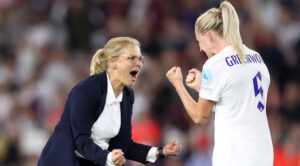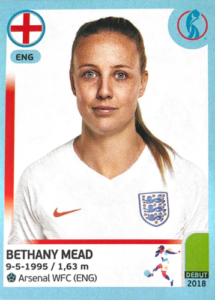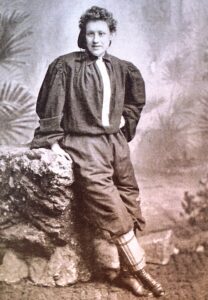Euro Ramblings – Final: England v Germany
 ‘Where it began, I can’t begin to knowing/but then I know it’s growing strong… Good times never seemed so good/I’ve been inclined to believe they never would.’ The lyrics to the song that has once again become an anthem this summer, ‘Sweet Caroline’, but how fitting those words seem in particular relation to women’s football after the Lionesses’ historic victory against Germany. Banned and ridiculed not so long ago, Leah Williamson and her teammates have given the game in England its biggest boost yet, whilst many of football’s foremothers and those who experienced it in its darker days may have believed such a time would never come. It is no surprise, therefore, that when the final whistle blew after 120 epic minutes at Wembley on Sunday that so many watching on found themselves teary-eyed or downright sobbing. What was so wonderful perhaps though about this outpouring of emotion was that it wasn’t just the Lionesses’ existing fans who have been caught up and carried along in the journey this summer, but a whole new audience of supporters who have been won over not only by the skill and ambition of these women, not only by the fair play and integrity of the game, not only by the friendly atmosphere and inclusivity of the stadiums, but also by that shared dream of English football fans to see football come home after over half a century. How we would have all loved to see the Three Lions triumph last year against Italy, but maybe there was something bigger, something predestined in the women achieving that success, on home soil, against the behemoth of Germany, to really lay the marker for the women’s game. A marker now that can never be erased. We needed permanence and prestige for the women’s game and it doesn’t come any bigger, any better than being written into the history books for all time.
‘Where it began, I can’t begin to knowing/but then I know it’s growing strong… Good times never seemed so good/I’ve been inclined to believe they never would.’ The lyrics to the song that has once again become an anthem this summer, ‘Sweet Caroline’, but how fitting those words seem in particular relation to women’s football after the Lionesses’ historic victory against Germany. Banned and ridiculed not so long ago, Leah Williamson and her teammates have given the game in England its biggest boost yet, whilst many of football’s foremothers and those who experienced it in its darker days may have believed such a time would never come. It is no surprise, therefore, that when the final whistle blew after 120 epic minutes at Wembley on Sunday that so many watching on found themselves teary-eyed or downright sobbing. What was so wonderful perhaps though about this outpouring of emotion was that it wasn’t just the Lionesses’ existing fans who have been caught up and carried along in the journey this summer, but a whole new audience of supporters who have been won over not only by the skill and ambition of these women, not only by the fair play and integrity of the game, not only by the friendly atmosphere and inclusivity of the stadiums, but also by that shared dream of English football fans to see football come home after over half a century. How we would have all loved to see the Three Lions triumph last year against Italy, but maybe there was something bigger, something predestined in the women achieving that success, on home soil, against the behemoth of Germany, to really lay the marker for the women’s game. A marker now that can never be erased. We needed permanence and prestige for the women’s game and it doesn’t come any bigger, any better than being written into the history books for all time.

In truth, the final was probably not the best game of football, and definitely not the Lionesses’ best performance, of the tournament, but there was something fitting about a nail-biting, hard-fought 2-1 victory over perennial winners Germany. In earlier games, England had shown various strings to their bow, with a determined 1-0 win over Austria, an 8-0 masterclass over Norway, a 4-0 demolition of Sweden and a dogged comeback against Spain. Being pegged back in the final proved a different test for the Lionesses and one that in previous years may have been their undoing. Indeed, many may have felt as if England had perhaps come unstuck once more after Lina Magull’s equaliser, but this is a different team led by a different manager, and an extra-time win only served to add yet another string to the Lionesses’ bow. They can rip teams apart, they can come back from the brink, and they can rally in adversity – in essence, they couldn’t be beaten. And with the backing of not only a record-breaking Euros attendance but of a growing national support, this England team proved just what can be achieved, wrapping up a memorable tournament but only just beginning their legacy.
 It would be remiss not to mention the two English goalscorers of the final – Ella Toone and Chloe Kelly – whose names will go down in history and very probably be quiz answers in decades to come. Toone’s goal would have been a fitting finale for England’s victory, a snapshot of the quality and skill that this tournament has evidenced, but Kelly’s own personal journey to triumph after injury setback is perhaps just as intrinsic to the Lionesses’ story of struggle and determination. Beth Mead walked away with the Golden Boot honours after her own disappointment at being left out of the Olympic squad last year, as well as the Player of the Tournament. And whilst I don’t want to take anything away from her and would happily have seen any of the 23-woman squad take the honour, for me Millie Bright and Keira Walsh were the unsung heroes, hardly ever putting a foot wrong and both playing vital if often understated roles throughout the tournament. As I said though, it’s impossible not to sing the praises of all of the team; from Mary Earps’ impressive game-changing saves, Leah Williamson’s top-notch reading of the game, Ellen White’s harrying forward play to Alessio Russo’s effervescent cameos. And, of course, who could forget the woman who oversaw it all – Sarina Wiegman. If she doesn’t get the manager of the year across the board, there’s something very wrong. In ten months, she has transformed not only the team’s fortunes but also revitalised the game in this country through the Lionesses and has done it all with a calmness, composure and humility that astounds.
It would be remiss not to mention the two English goalscorers of the final – Ella Toone and Chloe Kelly – whose names will go down in history and very probably be quiz answers in decades to come. Toone’s goal would have been a fitting finale for England’s victory, a snapshot of the quality and skill that this tournament has evidenced, but Kelly’s own personal journey to triumph after injury setback is perhaps just as intrinsic to the Lionesses’ story of struggle and determination. Beth Mead walked away with the Golden Boot honours after her own disappointment at being left out of the Olympic squad last year, as well as the Player of the Tournament. And whilst I don’t want to take anything away from her and would happily have seen any of the 23-woman squad take the honour, for me Millie Bright and Keira Walsh were the unsung heroes, hardly ever putting a foot wrong and both playing vital if often understated roles throughout the tournament. As I said though, it’s impossible not to sing the praises of all of the team; from Mary Earps’ impressive game-changing saves, Leah Williamson’s top-notch reading of the game, Ellen White’s harrying forward play to Alessio Russo’s effervescent cameos. And, of course, who could forget the woman who oversaw it all – Sarina Wiegman. If she doesn’t get the manager of the year across the board, there’s something very wrong. In ten months, she has transformed not only the team’s fortunes but also revitalised the game in this country through the Lionesses and has done it all with a calmness, composure and humility that astounds.

And while Sarina should be collecting this year’s managerial accolades, the Lionesses should be nailed on for all other team and individual awards. Without wanting to draw comparison, if this was the men’s team, there would be national honours, books deals and every other endorsement under the sun, and rightly so. However, it seems as if the women have already slipped under the radar with a joyous yet strangely timed and grossly undervalued ceremony in Trafalgar Square. This may not have been a world triumph, but surely a parade and a Wembley-stadium sized reception would have not been too much to except and too little to deserve for conquering Euro and bringing home the first international trophy since 1966? This is the time that the powers that be should really be galvanising the support and enthusiasm in the women’s game and making hay. Alex Scott’s impassioned calling out of several stadium partners who failed to support Euro 2022 was a reminder that the women’s rise to the top has often been played out against a backdrop of challenges and barriers even in their own back yard. But for hosts such as Rotherham, Brighton and Milton Keynes, their support of the tournament not only reflected positively on them but also showcased some of the country’s stadium gems. And it is this sense of support and endorsement not only from the hosts, but pundits and presenters, and most crucially fans young and old, new and existing, that will be one of the lasting memories of this tournament and England’s impressive victory. And long may it continue.
Jade Craddock


 Goal-line technology – While VAR may be the bane of many football fans’ lives (we’ve all heard the chants telling VAR just what to do), goal-line technology may just be the saviour. Yet, though the women’s game has seen significant leaps towards professionalism and parity with the men’s game in recent years, one outstanding issue relates to the use – or, rather, lack of use – of technology in the domestic format. It is something that those working in the women’s game continue to push for, and last night only served to prove its necessity. While Beth Mead’s well-taken goal wasn’t as definitive at first glance as Frank Lampard’s 2010 ‘ghost goal’, goal-line technology left no doubt as to its validity with an instantaneous verdict (minus the unnecessary VAR check afterwards) that ultimately granted the Lionesses their rightful victory. How different it would have been, however, were this a WSL or cup game played away from one of the larger stadiums that have the technology installed. It is easy to dismiss and lament technology in football, but it is a prerequisite of the top-level professional game, and without it, the domestic women’s game risks being left behind once more and its players not getting the fair and professional dues they deserve.
Goal-line technology – While VAR may be the bane of many football fans’ lives (we’ve all heard the chants telling VAR just what to do), goal-line technology may just be the saviour. Yet, though the women’s game has seen significant leaps towards professionalism and parity with the men’s game in recent years, one outstanding issue relates to the use – or, rather, lack of use – of technology in the domestic format. It is something that those working in the women’s game continue to push for, and last night only served to prove its necessity. While Beth Mead’s well-taken goal wasn’t as definitive at first glance as Frank Lampard’s 2010 ‘ghost goal’, goal-line technology left no doubt as to its validity with an instantaneous verdict (minus the unnecessary VAR check afterwards) that ultimately granted the Lionesses their rightful victory. How different it would have been, however, were this a WSL or cup game played away from one of the larger stadiums that have the technology installed. It is easy to dismiss and lament technology in football, but it is a prerequisite of the top-level professional game, and without it, the domestic women’s game risks being left behind once more and its players not getting the fair and professional dues they deserve. First-game nerves? – A home Euros. Stepping out at Old Trafford. A record 68,871 spectators. What’s there to be nervous about? Oh, and I forgot to mention the millions viewing around the world. Yes, the Lionesses would be forgiven for getting a touch of stage fright, but whilst the score may have been a conservative 1-0, in truth it was a largely comfortable and efficient first outing for Sarina Wiegman’s charges. Beth Mead’s deft first touch and perfectly lobbed second for England’s goal will likely got the headlines and it was a fitting winner, but there were impressive performances all over the pitch. A largely untroubled Mary Earps pulled off a crucial brace of saves in the second half. Keira Walsh’s understated but vital role in the heart of midfield allowed England’s forward-thinking players the freedom to attack. Lauren Hemp was typically probing, whilst Lucy Bronze continues to prove why she was labelled Best FIFA Women’s Player in 2020. But the star of the show for me was Millie Bright. In a close and potentially sticky first-round encounter, the experienced centre-back missed very little, ridding the England defence of danger on numerous occasions and proving tricky to mark on attacking set pieces. If there was a header to be won, there was never any doubt over who would win it, and with such authority at the back that only serves to bolster those in front. On this display, the Lionesses tournament is looking Bright.
First-game nerves? – A home Euros. Stepping out at Old Trafford. A record 68,871 spectators. What’s there to be nervous about? Oh, and I forgot to mention the millions viewing around the world. Yes, the Lionesses would be forgiven for getting a touch of stage fright, but whilst the score may have been a conservative 1-0, in truth it was a largely comfortable and efficient first outing for Sarina Wiegman’s charges. Beth Mead’s deft first touch and perfectly lobbed second for England’s goal will likely got the headlines and it was a fitting winner, but there were impressive performances all over the pitch. A largely untroubled Mary Earps pulled off a crucial brace of saves in the second half. Keira Walsh’s understated but vital role in the heart of midfield allowed England’s forward-thinking players the freedom to attack. Lauren Hemp was typically probing, whilst Lucy Bronze continues to prove why she was labelled Best FIFA Women’s Player in 2020. But the star of the show for me was Millie Bright. In a close and potentially sticky first-round encounter, the experienced centre-back missed very little, ridding the England defence of danger on numerous occasions and proving tricky to mark on attacking set pieces. If there was a header to be won, there was never any doubt over who would win it, and with such authority at the back that only serves to bolster those in front. On this display, the Lionesses tournament is looking Bright.